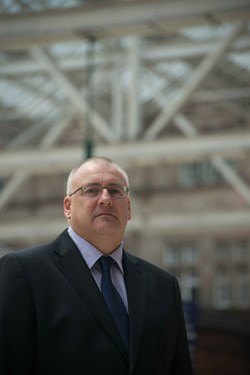It was an unusual situation in which Serco found itself. When the company was awarded the Caledonian Sleeper franchise last year, it was intended that ownership would transfer at 0200 on April 1 2015. That’s the time most operators change hands, but that would prove difficult for the Sleeper - that’s the time its trains are running.
Peter Strachan, Caledonian Sleeper Managing Director, explains: “We said to Transport Scotland and to First: ‘why don’t we change on March 31, rather than April 1?’
“So what’s actually happening is we hand over at 1400 on March 31. Every positioning, every train, every movement, every staff member booking on for the evening services of the Caledonian Sleeper. Which I think is a much more sensible suggestion. That was our suggestion. We thought about it when we were doing immobilisation.”
This franchise is a first. It will be the first time the Anglo-Scottish Sleepers have been operated away from the main ScotRail franchise, and indeed the first time any Sleeper trains have formed their own franchise (the UK has only the Caledonian Sleepers and the First Great Western London Paddington-Penzance trains).
Says Strachan: “I don’t think it’s a risk. I think it’s a very sensible decision from Transport Scotland’s point of view, to split it over the main franchise. If I think back to my InterCity days, in any ownership of either British Rail or subsequent franchise, the Sleeper has always been one of 2% of the rest of the activity.”
(When the deal was awarded on May 28 2014, operator FirstGroup - until March 30 - said: “The Sleeper services, which currently operate four cross-border trains per night, constitute 2% of First ScotRail’s total annual revenue.”)
Strachan clearly thinks the Sleepers have been neglected, but not through direct choice: “I think, talking with staff as we have been doing, everybody has said it’s really good to see a lot of management attention. Meeting people, a dedicated focus, I think people will value that.”
More than 90 staff are transferring from the ScotRail franchise, but there are also vacancies. In terms of staff numbers, the Caledonain Sleeper franchise is not very big, but in terms of passenger miles it is huge.
“Think about the term lengths of some of the on-train team. If you work a ‘Highlander’ on the Fort William leg - you’re booking on, you’re leaving Euston at 2115, and you’re into Fort William not much before 1000.”
The attitude of staff has impressed Strachan: “I’ve been massively impressed with the dedication, the commitment and welcome that they give people. I said to some colleagues this week, I’ve done lots of transitions and emergencies, and I can’t think of a team that’s been more engaged in relations than people we’ve had this week. We’re really, really, really strong.
“Some of the things we’ve been doing are quite different. We’ve started talking about new rolling stock - they’re excited about that. We’ve been taking them through the new menu, the new food and drink offer, the new uniforms. And people have been going ‘this is really good’. There’s passion there anyway, there’s that dedication, and they really want to get going.”
Serco has made the decision to be based in Inverness. Strachan elaborates: “We wanted to break the mould of Glasgow. I think traditionally in Scotland, the railway has been central in Buchanan House forever.”
He says that moving to the Highlands sends a message. Some of his team, including former Network Rail Route Managing Director David Simpson, who is now Production Team Director, will be based there “because that’s where the relationships will have to be”. But his reasoning for Inverness is also: “We thought that the Sleeper is Scottish, what better place than the capital of the Highlands to have it?”
He admits to being surprised at the response: “I thought it’d be quite difficult to try and go to Inverness, but actually the reverse is true. We said to respective candidates that the job is in Inverness, and they’ve thought that’s good, that’s really good.
“When we put the advert out, we weren’t sure what we were going to get in Inverness. But I’m really, really pleased that we’ve got really good people.”
What about the markets - which is the biggest?
Certainly in the summer, that’s Fort William. Says Strachan: “We run four or five in the summer months, but we find the loadings are historically very strong, and since we opened the new website at the beginning of January, Fort William has been particularly strong. Inverness has also been strong. The one we want to have a look at is Aberdeen - it doesn’t seem to have performed, historically, as strongly as Fort William and Inverness.”
















Login to comment
Comments
No comments have been made yet.